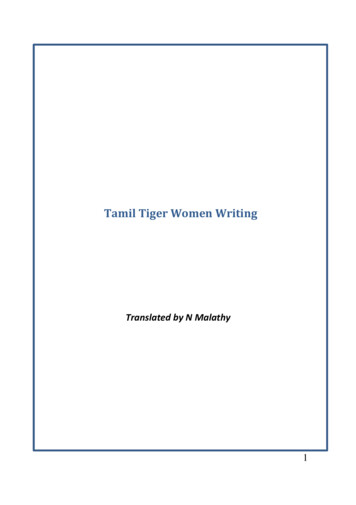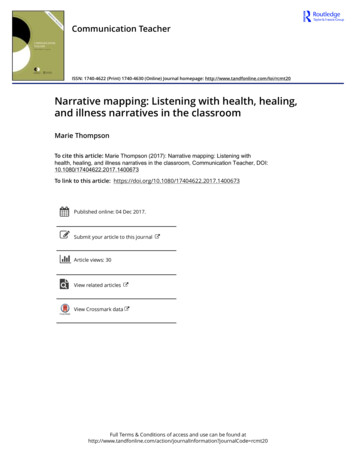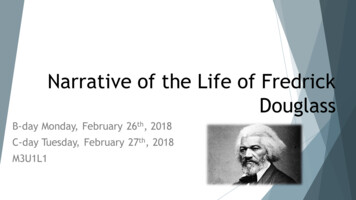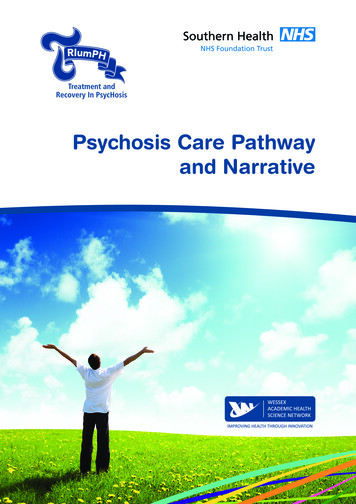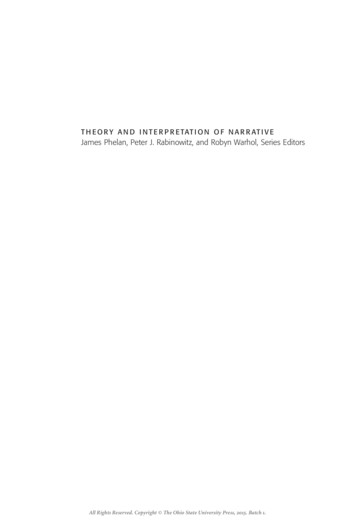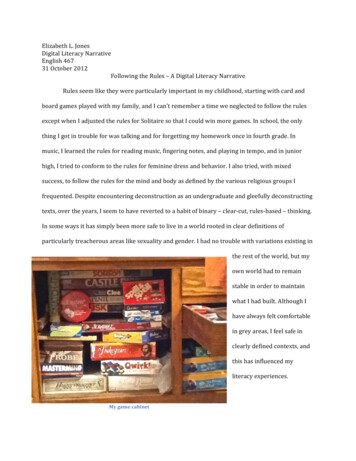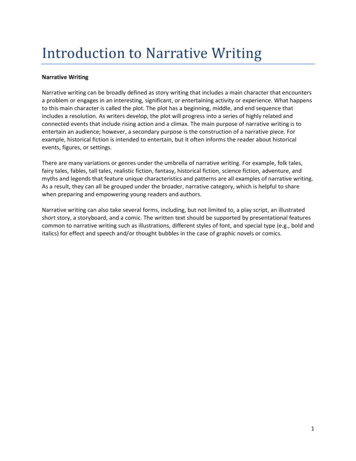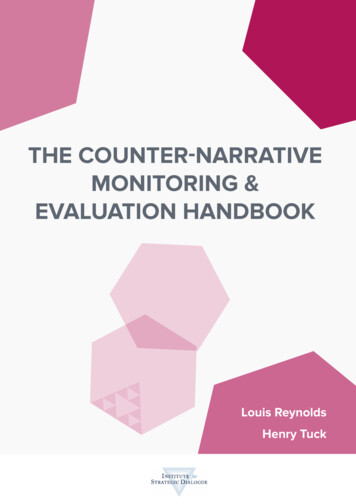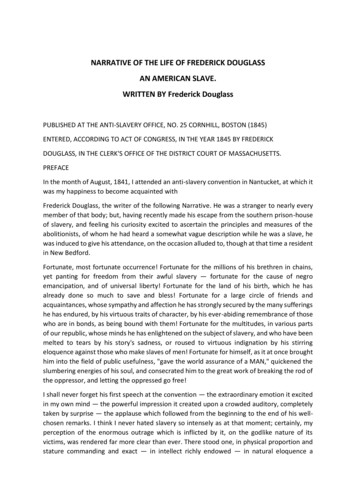
Transcription
NARRATIVE OF THE LIFE OF FREDERICK DOUGLASSAN AMERICAN SLAVE.WRITTEN BY Frederick DouglassPUBLISHED AT THE ANTI-SLAVERY OFFICE, NO. 25 CORNHILL, BOSTON (1845)ENTERED, ACCORDING TO ACT OF CONGRESS, IN THE YEAR 1845 BY FREDERICKDOUGLASS, IN THE CLERK'S OFFICE OF THE DISTRICT COURT OF MASSACHUSETTS.PREFACEIn the month of August, 1841, I attended an anti-slavery convention in Nantucket, at which itwas my happiness to become acquainted withFrederick Douglass, the writer of the following Narrative. He was a stranger to nearly everymember of that body; but, having recently made his escape from the southern prison-houseof slavery, and feeling his curiosity excited to ascertain the principles and measures of theabolitionists, of whom he had heard a somewhat vague description while he was a slave, hewas induced to give his attendance, on the occasion alluded to, though at that time a residentin New Bedford.Fortunate, most fortunate occurrence! Fortunate for the millions of his brethren in chains,yet panting for freedom from their awful slavery — fortunate for the cause of negroemancipation, and of universal liberty! Fortunate for the land of his birth, which he hasalready done so much to save and bless! Fortunate for a large circle of friends andacquaintances, whose sympathy and affection he has strongly secured by the many sufferingshe has endured, by his virtuous traits of character, by his ever-abiding remembrance of thosewho are in bonds, as being bound with them! Fortunate for the multitudes, in various partsof our republic, whose minds he has enlightened on the subject of slavery, and who have beenmelted to tears by his story's sadness, or roused to virtuous indignation by his stirringeloquence against those who make slaves of men! Fortunate for himself, as it at once broughthim into the field of public usefulness, "gave the world assurance of a MAN," quickened theslumbering energies of his soul, and consecrated him to the great work of breaking the rod ofthe oppressor, and letting the oppressed go free!I shall never forget his first speech at the convention — the extraordinary emotion it excitedin my own mind — the powerful impression it created upon a crowded auditory, completelytaken by surprise — the applause which followed from the beginning to the end of his wellchosen remarks. I think I never hated slavery so intensely as at that moment; certainly, myperception of the enormous outrage which is inflicted by it, on the godlike nature of itsvictims, was rendered far more clear than ever. There stood one, in physical proportion andstature commanding and exact — in intellect richly endowed — in natural eloquence a
prodigy — in soul manifestly "created but a little lower than the angels" — yet a slave, ay, afugitive slave, trembling for his safety, hardly daring to believe that on the American soil, asingle white person could be found who would befriend him at all hazards, for the love of Godand humanity! Capable of high attainments as an intellectual and moral being; needingnothing but a comparatively small amount of cultivation to make him an ornament to societyand a blessing to his race; by the law of the land, by the voice of the people, by the terms ofthe slave code, he was only a piece of property, a beast of burden, nevertheless!A beloved friend from New Bedford prevailed on Mr. Douglass to address the convention: Hecame forward to the platform with a hesitancy and embarrassment, necessarily theattendants of a sensitive mind in such a novel position. After apologizing for his ignorance,and reminding the audience that slavery was a poor school for the human intellect and heart,he proceeded to narrate some of the facts in his own history as a slave, and in the course ofhis speech gave utterance to many noble thoughts and thrilling reflections. As soon as he hadtaken his seat, filled with hope and admiration, I rose, and declared that Patrick Henry, ofrevolutionary fame, never made a speech more eloquent in the cause of liberty, than the onewe had just listened to from the lips of that hunted fugitive. So I believed at that time — suchis my belief now. I reminded the audience of the peril which surrounded this self-emancipatedyoung man at the North, even in Massachusetts, on the soil of the Pilgrim Fathers, among thedescendants of revolutionary sires; and I appealed to them, whether they would ever allowhim to be carried back into slavery, law or no law, constitution or no constitution. Theresponse was unanimous and in thunder-tones — "NO!" "Will you help and protect him as abrother-man — a resident of the old Bay State?" "YES!" shouted the whole mass, with anenergy so startling, that the ruthless tyrants south of Mason and Dixon's line might almosthave heard the mighty burst of feeling, and recognized it as the pledge of an undefeatabledetermination, on the part of those who gave it, never to betray him that wanders, but tohide the outcast, and firmly to abide the consequences.It was at once deeply impressed upon my mind, that, if Mr. Douglass could be persuaded toconsecrate his time and talents to the promotion of the anti-slavery enterprise, a powerfulimpetus would be given to it, and a stunning blow at the same time inflicted on northernprejudice against a colored complexion. I therefore endeavored to instil hope and courageinto his mind, in order that he might dare to engage in a vocation so anomalous andresponsible for a person in his situation; and I was seconded in this effort by warm-heartedfriends, especially by the late General Agent of the Massachusetts Anti-Slavery Society, Mr.John A. Collins, whose judgment in this instance entirely coincided with my own. At first, hecould give no encouragement; with genuine modesty he expressed his conviction that he wasnot adequate to the performance of so great a task; the path marked out was wholly aunknown one; he was sincerely apprehensive that he should do more harm than good. Aftermuch deliberation, however, he consented to make a trial; and ever since that period, he hasacted as a lecturing agent, under the auspices either of the American or the MassachusettsAnti-Slavery Society. In labors he has been most abundant; and his success in combatingprejudice, in gaining converts to the cause, in agitating the public mind, has far surpassed themost optimistic expectations that were raised at the commencement of his brilliant career.He has borne himself with gentleness and meekness, yet with true manliness of character. As
a public speaker, he excels in expressing sadness, wit, comparison, imitation, strength ofreasoning, and fluency of language. There is in him that union of head and heart, which isindispensable to an enlightenment of the heads and a winning of the hearts of others. Mayhis strength continue to be equal to his day! May he continue to "grow in grace, and in theknowledge of God," that he may be increasingly serviceable in the cause of bleedinghumanity, whether at home or abroad!It is certainly a very remarkable fact, that one of the most efficient advocates of the slavepopulation, now before the public, is a fugitive slave, in the person of Frederick Douglass; andthat the free colored population of the United States are as ably represented by one of theirown number, in the person of Charles Lenox Remond, whose eloquent appeals have extortedthe highest applause of multitudes on both sides of the Atlantic. Let those who lie about thecolored race despise themselves for their poor morals and meanness of spirit, and henceforthcease to talk of the natural inferiority of those who require nothing but time and opportunityto attain to the highest point of human excellence.It may, perhaps, be fairly questioned, whether any other portion of the population of theearth could have endured the deprivation, sufferings and horrors of slavery, without havingbecome more degraded in the scale of humanity than the slaves of African descent. Nothinghas been left undone to cripple their intellects, darken their minds, undermine their moralnature, obliterate all traces of their relationship to mankind; and yet how wonderfully theyhave sustained the mighty load of a most frightful burden under which they have beengroaning for centuries! To illustrate the effect of slavery on the white man, to show that hehas no powers of endurance, in such a condition, superior to those of his black brother, DanielO'Connell, the distinguished advocate of universal emancipation, and the mightiest championof weakened but not conquered Ireland, relates the following anecdote in a speech deliveredby him in the Conciliation Hall, Dublin, before the Loyal National Repeal Association, March31, 1845. "No matter," said Mr. O'Connell, "under what misleading term it may disguise itself,slavery is still hideous. It has a natural, an inevitable tendency to brutalize every noble facultyof man. An American sailor, who was cast away on the shore of Africa, where he was kept inslavery for three years, was, at the expiration of that period, found to be diminished as a man— he had lost all reasoning power; and having forgotten his native language, could only utteran incomprehensible blend of Arabic and English, which nobody could understand, and whicheven he himself found difficulty in pronouncing. So much for the positive influence of "TheDomestic Institution!" Admitting this to have been an extraordinary case of mentaldeterioration, it proves at least that the white slave can sink as low in the scale of humanityas the black one.Mr. Douglass has very properly chosen to write his own Narrative, in his own style, andaccording to the best of his ability, rather than to employ someone else. It is, therefore,entirely his own production; and, considering how long and dark was the career he had to runas a slave, how few have been his opportunities to improve his mind since he broke his ironfetters, it is, in my judgment, highly creditable to his head and heart. He who can peruse itwithout a tearful eye, a heaving breast, an afflicted spirit, without being filled with anunutterable abhorrence of slavery and all its advocates and animated with a determination
to seek the immediate overthrow of that hateful system, without trembling for the fate ofthis country in the hands of a righteous God, who is ever on the side of the oppressed, andwhose arm is not shortened that it cannot save, must have a flinty heart, and be qualified toact the part of a trafficker "in slaves and the souls of men." I am confident that it is essentiallytrue in all its statements; that nothing has been set down in malice, nothing exaggerated,nothing drawn from the imagination; that it comes short of the reality, rather than overstatesa single fact in regard to slavery as it is. The experience of Frederick Douglass, as a slave, wasnot a peculiar one; his lot was not especially a hard one; his case may be regarded as a veryfair specimen of the treatment of slaves in Maryland, in which State it is conceded that theyare better fed and less cruelly treated than in Georgia, Alabama, or Louisiana. Many havesuffered incomparably more, while very few on the plantations have suffered less, thanhimself. Yet how deplorable was his situation! What terrible punishments were inflicted uponhis person! What still more shocking outrages were perpetrated upon his mind! With all hisnoble powers and sublime aspirations, how like a brute was he treated, even by thoseprofessing to have the same mind in them that was in Christ Jesus! To what dreadful liabilitieswas he continually subjected! How destitute of friendly counsel and aid, even in his greatestextremities! How heavy was the midnight of woe which shrouded in blackness the last ray ofhope, and filled the future with terror and gloom! What longings after freedom tookpossession of his breast, and how his misery augmented, in proportion as he grew reflectiveand intelligent, thus demonstrating that a happy slave is an extinct man! How he thought,reasoned, felt, under the lash of the driver, with the chains upon his limbs! What perils heencountered in his endeavors to escape from his horrible doom! And how powerful has beenthe symbol of his freedom and preservation in the midst of a nation of pitiless enemies!This Narrative contains many affecting incidents, many passages of great eloquence andpower; but I think the most thrilling one of them all is the description Douglass gives of hisfeelings, as he stood narrating his life, and the chances of his one day being a freeman, on thebanks of the Chesapeake Bay — viewing the receding vessels as they flew with their whitewings before the breeze, and foregrounding them as animated by the living spirit of freedom.Who can read that passage, and be insensitive to its sadness and sublimity? Compressed intoit is a whole library of thought, feeling, and sentiment — all that can, all that need be urged,in the form of protest, sincere appeal, rebuke, against that crime of crimes: making man theproperty of his fellow-man! O, how hideous is that system, which entombs the godlike mindof man, ruins the divine image, reduces those who by creation were crowned with glory andhonor to a level with four-footed beasts, and exalts the dealer in human flesh above all thatis called God! Why should its existence be prolonged one hour? Is it not evil, only evil, andthat continually? What does its presence imply but the absence of all fear of God, all regardfor man, on the part of the people of the United States? Heaven speed its eternal overthrow!So profoundly ignorant of the nature of slavery are many persons, that they are stubbornlyincredulous whenever they read or listen to any recital of the cruelties which are daily inflictedon its victims. They do not deny that the slaves are held as property; but that terrible factseems to convey to their minds no idea of injustice, exposure to outrage, or savage cruelty.Tell them of cruel whippings, of mutilations, of scenes of pollution and blood, of thebanishment of all light and knowledge, and they affect to be greatly indignant at such
enormous exaggerations, such wholesale lies, such intolerable libels on the character of thesouthern planters! As if all these dire outrages were not the natural results of slavery! As if itwere less cruel to reduce a human being to the condition of a thing, than to give him a severewhipping, or to deprive him of necessary food and clothing! As if whips, chains, thumb-screws,paddles, blood-hounds, overseers, drivers, patrols, were not all indispensable to keep theslaves down, and to give protection to their ruthless oppressors! As if, when the marriageinstitution is abolished adultery, and incest, must not necessarily abound; when all the rightsof humanity are annihilated, any barrier remains to protect the victim from the fury of thespoiler; when absolute power is assumed over life and liberty, it will not be wielded withdestructive sway! Skeptics of this character abound in society. In some few instances, theirdisbelief arises from a want of reflection; but, generally, it indicates a hatred of the light, adesire to shield slavery from the assaults of its foes, a contempt of the colored race, whetherbond or free. Such will try to discredit the shocking tales of cruelty towards slaves which arerecorded in this truthful Narrative; but they will labor in vain. Mr. Douglass has franklydisclosed the place of his birth, the names of those who claimed ownership in his body andsoul, and the names also of those who committed the crimes which he has alleged againstthem. His statements, therefore, may easily be disproved, if they are untrue.In the course of his Narrative, he relates two instances of murderous cruelty, in one of whicha planter deliberately shot a slave belonging to a neighboring plantation, who hadunintentionally gotten within his lordly domain in quest of fish; and in the other, an overseerblew out the brains of a slave who had fled to a stream of water to escape a bloody scourging.Mr. Douglass states that in neither of these instances was anything done by way of legal arrestor judicial investigation. The Baltimore American, of March 17, 1845, relates a similar case ofatrocity, perpetrated with similar freedom from prosecution — as follows:"Shooting a slave. We learn, upon the authority of a letter from Charles county, Maryland,received by a gentleman of this city, that a young man, named Matthews, a nephew ofGeneral Matthews, and whose father, it is believed, holds an office at Washington, killed oneof the slaves upon his father's farm by shooting him. The letter states that young Matthewshad been left in charge of the farm; that he gave an order to the servant, which was notobeyed, when he proceeded to the house, obtained a gun, and, returning, shot the servant.He immediately, the letter continues, fled to his father's residence, where he still remainsunmolested."Let it never be forgotten, that no slaveholder or overseer can be convicted of any outrageperpetrated on the person of a slave, however evil it may be, on the testimony of coloredwitnesses, whether bond or free. By the slave code, they are judged to be incompetent totestify against a white man, as though they were indeed a part of the brute creation. Hence,there is no legal protection in fact, whatever there may be in form, for the slave population;and any amount of cruelty may be inflicted on them without consequences. Is it possible forthe human mind to conceive of a more horrible state of society? The effect of a religiousprofession on the conduct of southern masters is vividly described in the following Narrative,and shown to be anything but a positive factor. In the nature of the case, it must be in thehighest degree pernicious. The testimony of Mr. Douglass, on this point, is sustained by a
cloud of witnesses, whose truthfulness is unimpeachable. "A slaveholder's profession ofChristianity is a palpable falsehood. He is a felon of the highest grade. He is a man-stealer. Itis of no importance what you put in the other scale."Reader! Are you with the man-stealers in sympathy and purpose, or on the side of their downtrodden victims? If with the former, then are you the foe of God and man. If with the latter,what are you prepared to do and dare in their behalf? Be faithful, be vigilant, be untiring inyour efforts to break every yoke, and let the oppressed go free. Come what may — cost whatit may — inscribe on the banner which you fly into the breeze, as your religious and politicalmotto — "NO COMPROMISE WITH SLAVERY! NO UNION WITH SLAVEHOLDERS!"WM. LLOYD GARRISON BOSTON, May 1, 1845.LETTER FROM WENDELL PHILLIPS, ESQ.BOSTON, APRIL 22, 1845.My Dear Friend:You remember the old fable of "The Man and the Lion," where the lion complained that heshould not be so misrepresented "when the lions wrote history."I am glad the time has come when the "lions write history." We have been left long enoughto gather the character of slavery from the involuntary evidence of the masters. One might,indeed, rest sufficiently satisfied with what, it is evident, must be, in general, the results ofsuch a relation, without seeking farther to find whether they have followed in every instance.Indeed, those who stare at the half-peck of corn a week, and love to count the lashes on theslave's back, are seldom the "stuff" out of which reformers and abolitionists are to be made.I remember that, in 1838, many were waiting for the results of the West India experiment,before they could come into our ranks. Those "results" have come long ago; but, alas! Few ofthat number have come with them, as converts. A man must be disposed to judge ofemancipation by other tests than whether it has increased the produce of sugar, and to hateslavery for other reasons than because it starves men and whips women, before he is readyto lay the first stone of his anti-slavery life.I was glad to learn, in your story, how early the most neglected of God's children waken to asense of their rights, and of the injustice done them. Experience is a keen teacher; and longbefore you had mastered your A B C, or knew where the "white sails" of the Chesapeake werebound, you began, I see, to gauge the wretchedness of the slave, not by his hunger and want,not by his lashes and toil, but by the cruel and blighting death which gathers over his soul.In connection with this, there is one circumstance which makes your recollections peculiarlyvaluable, and renders your early insight the more remarkable. You come from that part of thecountry where we are told slavery appears with its fairest features. Let us hear, then, what itis at its best estate — gaze on its bright side, if it has one; and then imagination may task herpowers to add dark lines to the picture, as she travels southward to that (for the colored man)Valley of the Shadow of Death, where the Mississippi sweeps along.
Again, we have known you long, and can put the most entire confidence in your truth,openness, and sincerity. Every one who has heard you speak has felt, and, I am confident,every one who reads your book will feel, persuaded that you give them a fair specimen of thewhole truth. No one-sided portrait, no wholesale complaints, but strict justice done,whenever individual kindliness has neutralized, for a moment, the deadly system with whichit was strangely allied. You have been with us, too, some years, and can fairly compare thetwilight of rights, which your race enjoy at the North, with that "noon of night" under whichthey labor south of Mason and Dixon's line. Tell us whether, after all, the half free coloredman of Massachusetts is worse off than the pampered slave of the rice swamps!In reading your life, no one can say that we have unfairly picked out some rare specimens ofcruelty. We know that the bitter drops, which even you have drained from the cup, are noincidental aggravations, no individual ills, but such as must mingle always and necessarily inthe lot of every slave. They are the essential ingredients, not the occasional results, of thesystem.After all, I shall read your book with trembling for you. Some years ago, when you werebeginning to tell me your real name and birthplace, you may remember I stopped you, andpreferred to remain ignorant of all. With the exception of a vague description, so I continued,till the other day, when you read me your memoirs. I hardly knew, at the time, whether tothank you or not for the sight of them, when I reflected that it was still dangerous, inMassachusetts, for honest men to tell their names! They say the fathers, in 1776, signed theDeclaration of Independence with the rope about their necks. You, too, publish yourdeclaration of freedom with danger surrounding you. In all the broad lands which theConstitution of the United States overshadows, there is no single spot, however narrow ordesolate, where a fugitive slave can plant himself and say, "I am safe." The whole repositoryof Northern Law has no shield for you. I am free to say that, in your place, I should throw theMS. into the fire.You, perhaps, may tell your story in safety, endeared as you are to so many warm hearts byrare gifts, and a still rarer devotion of them to the service of others. But it will be owing onlyto your labors, and the fearless efforts of those who, trampling the laws and Constitution ofthe country under their feet, are determined that they will "hide the outcast," and that theirhearths shall be, spite of the law, an asylum for the oppressed, if, some time or other, thehumblest may stand in our streets, and bear witness in safety against the cruelties of whichhe has been the victim.Yet it is sad to think, that these very throbbing hearts which welcome your story, and formyour best safeguard in telling it, are all beating contrary to the "statute in such case made andprovided." Go on, my dear friend, till you, and those who, like you, have been saved, so as byfire, from the dark prison-house, shall stereotype these free, illegal pulses into statutes; andNew England, cutting loose from a blood-stained Union, shall glory in being the house ofrefuge for the oppressed, till we no longer merely "hide the outcast," or make a merit ofstanding idly by while he is hunted in our midst; but, consecrating anew the soil of the Pilgrimsas an asylum for the oppressed, proclaim our welcome to the slave so loudly, that the tones
shall reach every hut in the Carolinas, and make the broken-hearted slave leap up at thethought of old Massachusetts.God speed the day!Till then, and ever, Yours truly, WENDELL PHILLIPSFREDERICK DOUGLASS.Frederick Douglass was born in slavery as Frederick Augustus Washington Bailey near Eastonin Talbot County, Maryland. He was not sure of the exact year of his birth, but he knew thatit was 1817 or 1818. As a young boy he was sent to Baltimore, to be a house servant, wherehe learned to read and write, with the assistance of his master's wife. In 1838 he escapedfrom slavery and went to New York City, where he married Anna Murray, a free coloredwoman whom he had met in Baltimore. Soon thereafter he changed his name to FrederickDouglass. In 1841 he addressed a convention of the Massachusetts Anti-Slavery Society inNantucket and so greatly impressed the group that they immediately employed him as anagent. He was such an impressive orator that numerous persons doubted if he had ever beena slave, so he wrote ‘Narrative of the Life of Frederick Douglass’. During the Civil War heassisted in the recruiting of colored men for the 54th and 55th Massachusetts Regiments andconsistently argued for the emancipation of slaves. After the war he was active in securingand protecting the rights of the freemen. In his later years, at different times, he was secretaryof the Santo Domingo Commission, marshall and recorder of deeds of the District ofColumbia, and United States Minister to Haiti. His other autobiographical works are ‘MyBondage and My Freedom’ and ‘Life and Times of Frederick Douglass’, published in 1855 and1881 respectively. He died in 1895.CHAPTER II was born in Tuckahoe, near Hillsborough, and about twelve miles from Easton, in TalbotCounty, Maryland. I have no accurate knowledge of my age, never having seen any authenticrecord containing it. By far the larger part of the slaves know as little of their ages as horsesknow of theirs, and it is the wish of most masters within my knowledge to keep their slavesthus ignorant. I do not remember to have ever met a slave who could tell of his birthday. Theyseldom come nearer to it than planting-time, harvest-time, cherry-time, spring-time, or falltime. A want of information concerning my own was a source of unhappiness to me evenduring childhood. The white children could tell their ages. I could not tell why I ought to bedeprived of the same privilege. I was not allowed to make any inquiries of my masterconcerning it. He deemed all such inquiries on the part of a slave improper and disrespectfuland evidence of a restless spirit. The nearest estimate I can give makes me now betweentwenty-seven and twenty-eight years of age. I come to this, from hearing my master say, sometime during 1835, I was about seventeen years old.My mother was named Harriet Bailey. She was the daughter of Isaac and Betsey Bailey, bothcolored, and quite dark. My mother was of a darker complexion than either my grandmotheror grandfather.
My father was a white man. He was admitted to be such by all I ever heard speak of myparentage. The opinion was also whispered that my master was my father; but of thecorrectness of this opinion, I know nothing; the means of knowing was withheld from me. Mymother and I were separated when I was but an infant — before I knew her as my mother. Itis a common custom, in the part of Maryland from which I ran away, to part children fromtheir mothers at a very early age. Frequently, before the child has reached its twelfth month,its mother is taken from it, and hired out on some farm a considerable distance off, and thechild is placed under the care of an old woman, too old for field labor. For what this separationis done, I do not know, unless it be to hinder the development of the child's affection towardits mother, and to blunt and destroy the natural affection of the mother for the child. This isthe inevitable result.I never saw my mother, to know her as such, more than four or five times in my life; and eachof these times was very short in duration, and at night. She was hired by a Mr. Stewart, wholived about twelve miles from my home. She made her journeys to see me in the night,travelling the whole distance on foot, after the performance of her day's work. She was a fieldhand, and a whipping is the penalty of not being in the field at sunrise, unless a slave hasspecial permission from his or her master to the contrary — a permission which they seldomget, and one that gives to him that gives it the proud name of being a kind master. I do notrecollect of ever seeing my mother by the light of day. She was with me in the night. Shewould lie down with me, and get me to sleep, but long before I awoke she was gone. Verylittle communication ever took place between us. Death soon ended what little we could havewhile she lived, and with it her hardships and suffering. She died when I was about sevenyears old, on one of my master's farms, near Lee's Mill. I was not allowed to be present duringher illness, at her death, or burial. She was gone long before I knew anything about it. Neverhaving enjoyed, to any considerable extent, her soothing presence, her tender and watchfulcare, I received the news of her death with much the same emotions I should have probablyfelt at the death of a stranger.Called thus suddenly away, she left me without the slightest intimation of who my father was.The whisper that my master was my father, may or may not be true; and, true or false, it is ofbut little consequence to my purpose whilst the fact remains, in all its glaring horr
ENTERED, ACCORDING TO ACT OF CONGRESS, IN THE YEAR 1845 BY FREDERICK DOUGLASS, IN THE CLERK'S OFFICE OF THE DISTRICT COURT OF MASSACHUSETTS. PREFACE In the month of August, 1841, I attended an anti-slavery convention in Nantucket, at which it was my happiness to become acquainted with Frederick Douglass, the writer of the following Narrative.



